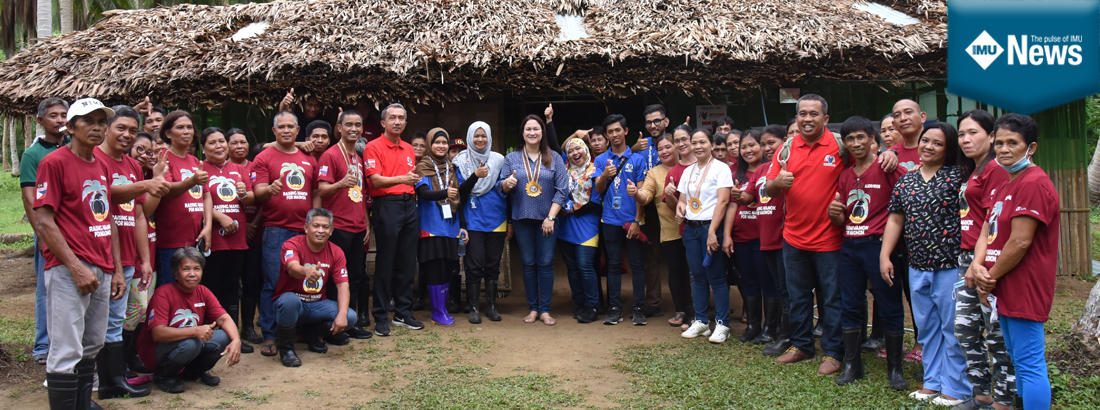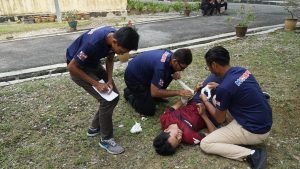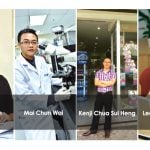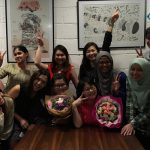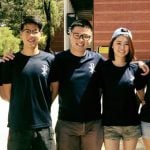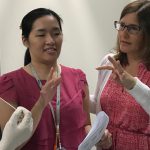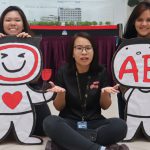“To be a good doctor, you must first be a good human being” -YBhg Tan Sri Dato’ Dr Abu Bakar Suleiman, President of IMU Group.
What IMU taught me was being a Good Samaritan through serving the community; that is when I decided to join programmes initiated by IMU Cares. When we speak about helping people who are in dire need, the first thought that would probably come to our mind is helping them with money. In general, it is true that money is the main factor when lending a hand. However, helping people isn’t just about only giving money. It can also be delivered via our actions. Serving the community is not only a manifestation of the University’s core values but also as part of experiential learning towards being an established healthcare professional. 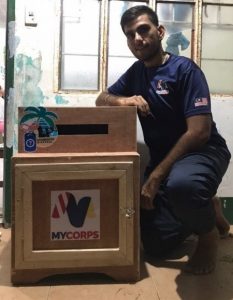 I was given the opportunity to practice humanitarianism in a 3 month-programme called MyCorps by the Ministry of Youth & Sports after being interviewed with over 300+ applicants. MyCorps is a life changing experience designed for Malaysian youths aged 18-30 years old to discover potential and purpose, by serving communities around the world while deepening their understanding of different cultures. This movement is initiated by the Ministry with the support of the Minister, YB Tuan Syed Saddiq bin Syed Abdul Rahman, with the purpose of preparing young and energised volunteers who would characterise themselves as a “Role Model” and “Volunteer Leader”, to cultivate the spirit of volunteerism and humanitarian among Malaysian youths. Past MyCorps projects include missions to Cambodia, Middle East (Jordan, Lubnan and Turkey), South Asia (Sri Lanka and Bangladesh), Africa (Sudan, Tanzania and Uganda) and recently in 7 states of Malaysia. This MyCorps mission to South East Asia is the 7th mission whereby youth volunteer leaders from different backgrounds come hand in hand to address issues and problems as well as propose solutions that would create a better place for underprivileged and indigenous people of Indonesia, Laos, Philippines and East Timor. The volunteers served the communities in the areas of education, medical, social and economic development to the marginalised societies. Volunteers collaborated with local communities and implemented related projects for sustainable living. This programme was implemented in three different phases. First Phase: Pre-departure Training (8 April 2019 to 8 May 2019) This one-month service training is a combination of fast-paced, action-packed sessions to prepare us mentally and physically to make a positive impact in communities. Firstly, I met 41 like-minded Malaysians who became my friends and then new family, and together, we underwent intensive training at an Outward Bound School, Lumut, Perak where we were tested on our skills in kayaking, rock climbing, camping and mountain rapelling and were disciplined like dormitory youths.
I was given the opportunity to practice humanitarianism in a 3 month-programme called MyCorps by the Ministry of Youth & Sports after being interviewed with over 300+ applicants. MyCorps is a life changing experience designed for Malaysian youths aged 18-30 years old to discover potential and purpose, by serving communities around the world while deepening their understanding of different cultures. This movement is initiated by the Ministry with the support of the Minister, YB Tuan Syed Saddiq bin Syed Abdul Rahman, with the purpose of preparing young and energised volunteers who would characterise themselves as a “Role Model” and “Volunteer Leader”, to cultivate the spirit of volunteerism and humanitarian among Malaysian youths. Past MyCorps projects include missions to Cambodia, Middle East (Jordan, Lubnan and Turkey), South Asia (Sri Lanka and Bangladesh), Africa (Sudan, Tanzania and Uganda) and recently in 7 states of Malaysia. This MyCorps mission to South East Asia is the 7th mission whereby youth volunteer leaders from different backgrounds come hand in hand to address issues and problems as well as propose solutions that would create a better place for underprivileged and indigenous people of Indonesia, Laos, Philippines and East Timor. The volunteers served the communities in the areas of education, medical, social and economic development to the marginalised societies. Volunteers collaborated with local communities and implemented related projects for sustainable living. This programme was implemented in three different phases. First Phase: Pre-departure Training (8 April 2019 to 8 May 2019) This one-month service training is a combination of fast-paced, action-packed sessions to prepare us mentally and physically to make a positive impact in communities. Firstly, I met 41 like-minded Malaysians who became my friends and then new family, and together, we underwent intensive training at an Outward Bound School, Lumut, Perak where we were tested on our skills in kayaking, rock climbing, camping and mountain rapelling and were disciplined like dormitory youths.
During this phase, we were selectively paired with local impact partners and received technical training based on the unique challenges we will solve in your international Mission. Each Mission is unique and addresses different issues, thus around 46 training modules covering aspects of education, emergency disaster management, first aid course, human rights, United Nations High Commissioner for Refugees (UNHCR) and many more were designed to expose us to the relevant skills we will need; from building houses to surviving in the wild. 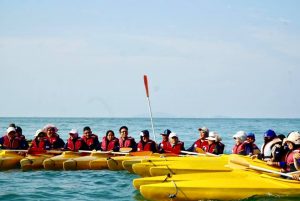 We also conducted fundraising activities online and on weekends to collect funds from Malaysians to finance our projects in Southeast Asian countries. Trust me, it was not easy to roam around under the scorching sun, asking for donations, using all kinds of ways to persuade the donors. On the final week of the training, we were given our placement during our deployment. With god’s grace, I was assigned to go to the Philippines to serve for 2 months. My teammates had their own expertise in Agriculture (Animal Husbandries), Chemical Engineering, Education, Human Resource while I am from the Medical (Pharmacy) aspect. I was fortunate to be on air on Selamat Pagi Malaysia@RTM 1 forum show to discuss on our preparedness to be deployed.
We also conducted fundraising activities online and on weekends to collect funds from Malaysians to finance our projects in Southeast Asian countries. Trust me, it was not easy to roam around under the scorching sun, asking for donations, using all kinds of ways to persuade the donors. On the final week of the training, we were given our placement during our deployment. With god’s grace, I was assigned to go to the Philippines to serve for 2 months. My teammates had their own expertise in Agriculture (Animal Husbandries), Chemical Engineering, Education, Human Resource while I am from the Medical (Pharmacy) aspect. I was fortunate to be on air on Selamat Pagi Malaysia@RTM 1 forum show to discuss on our preparedness to be deployed.
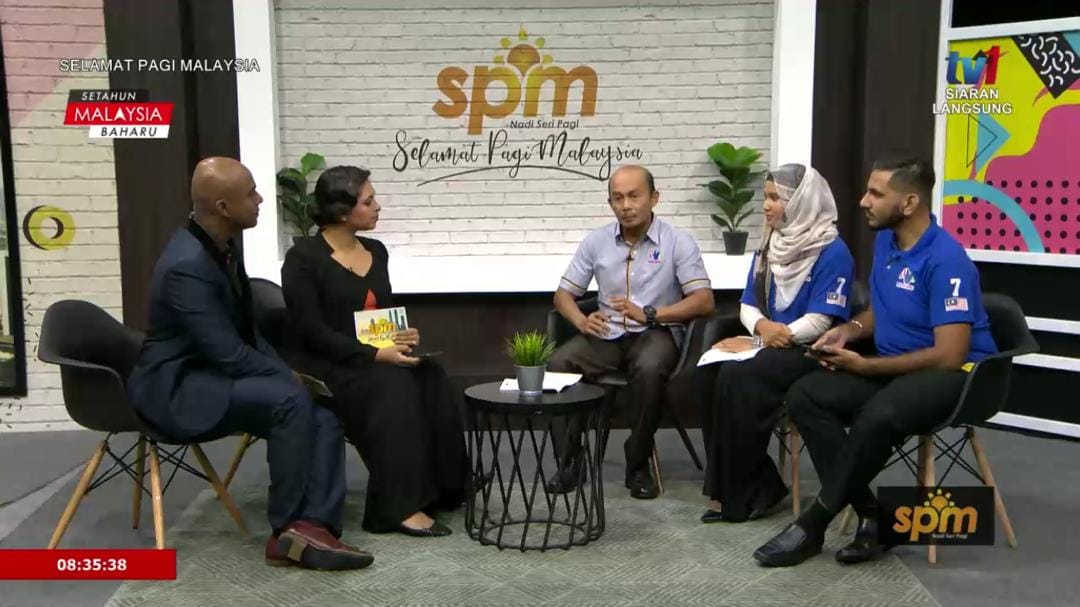
Second Phase: Deployment Phase (14 May 2019 to 14 July 2019) We flew to Manila, and met the Chief de Mission of the Embassy of Malaysia. He gave few tips and advice on how to report if anything goes wrong or if any disaster takes place, knowing that the Philippines lies on a typhoon belt called Ring of Fire, where many earthquakes and volcanic eruptions occur. Then we ride on a 13-hour bus trip to Legazpi, Albay region in which we were to conduct our projects. Our team was hosted by Social Action Center, a non-government organisation in which they assisted us by introducing us to the Albay community. Knowing Legazpi was the capital city of Albay, we decided to shift our attention to lesser privileged municipalities, and they are: Ligao & Tiwi. Ligao has the largest number of barangays (villages) among all municipalities in the Albay province. At first, we had difficulties in finding a home to stay, but thankfully one of the barangay captains decided to offer us a home for free. Frequent blackouts occurred during our stay and the Albay community said the blackouts are quite common for years and told us to be prepared with emergency lights. 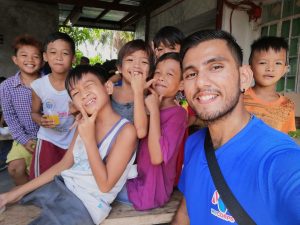 In the first two weeks, we conducted a needs assessment in which we were to recognize potential projects in the upland (geothermal villages) and lowland (coastal villages) in Ligao. Communication was a bit of a problem as Bikol as the native language, was a challenge for us to understand, however according to the Embassy of Malaysia in the Philippines, the Chief de Mission said we shared almost 2600 similar words: for example: payung(bikol)= payung (malay). It was a challenge yet we were able to learn from the surrounding community. Throughout the remaining 6 weeks, we surveyed and discussed on potential projects based on our skills’ and expertise. Below were the list of main projects conducted throughout our humanitarian mission:
In the first two weeks, we conducted a needs assessment in which we were to recognize potential projects in the upland (geothermal villages) and lowland (coastal villages) in Ligao. Communication was a bit of a problem as Bikol as the native language, was a challenge for us to understand, however according to the Embassy of Malaysia in the Philippines, the Chief de Mission said we shared almost 2600 similar words: for example: payung(bikol)= payung (malay). It was a challenge yet we were able to learn from the surrounding community. Throughout the remaining 6 weeks, we surveyed and discussed on potential projects based on our skills’ and expertise. Below were the list of main projects conducted throughout our humanitarian mission:
| Projects | Details | Target beneficiaries |
|---|---|---|
| Raising Manok for Maonon (RM4M) | A sustainable project that would help 33 farmers and fishermen to earn income especially during the monsoon season through chicken raising and breeding. | 33 farmers and fishermen 55 other villages (over 105,000 people) |
| Coastal Care | A re-landscaping project that focuses on better healthcare engagement with patients and lying-in committee and combat against drug resistance through Safe Medicine Disposal Programme. | 754 families in Maonon |
| Active Learning Classroom | A refurbishment project that provides new learning experience and enhancing the learning system through establishment of sensory walls and virtual learning technology. | 65 new enrolled kids bi-annually in Maonon |
| Seed of Light | An in-kind contribution that benefits the needy families through solar light and seedlings distribution that would help tackle SDG Goal 1: No Poverty. | 15 needy families of Purok 5, Maonon |
| Binatagan Basketball Court Refurbishment | A refurbishment project that enhances the appearance and the ambience of the basketball court that been affected by typhoon. | 20 youths daily 200 Binatagan Youths |
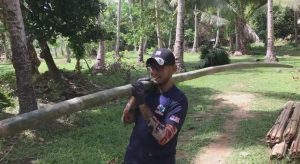
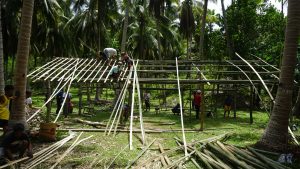 We also conducted 15 other mini projects and most of them were one-off programmes in which we focused on contributing toiletries to prisoners, newborn preparatory kits to mothers, sports carnival for the deaf etc. Throughout the deployment phase, I was in-charge of leading the healthcare-based project, photography/videography and also article writing for press release. The workload was a bit of a burden yet nothing is impossible. On the last day of our deployment, we had official visits from the ministry, city mayor and city officials to officiate our closing ceremony and projects over in Maonon. Last Phase: Assessment and Recognition phase (15 July to 20 July 2019) In this phase, we were back to our homeland in which we were to finalise the financial accounts and final project reports. During this phase, I have learnt the importance of accounts and donation that the kind Malaysians gave during the pre-departure training. Every cent counts! On 19 July 2019, our celebration day, we were recognized for our hardwork, dedication and the high value of humanity instilled in us. We were all awarded a plaque and certificate by the Minister of Youth and Sports.
We also conducted 15 other mini projects and most of them were one-off programmes in which we focused on contributing toiletries to prisoners, newborn preparatory kits to mothers, sports carnival for the deaf etc. Throughout the deployment phase, I was in-charge of leading the healthcare-based project, photography/videography and also article writing for press release. The workload was a bit of a burden yet nothing is impossible. On the last day of our deployment, we had official visits from the ministry, city mayor and city officials to officiate our closing ceremony and projects over in Maonon. Last Phase: Assessment and Recognition phase (15 July to 20 July 2019) In this phase, we were back to our homeland in which we were to finalise the financial accounts and final project reports. During this phase, I have learnt the importance of accounts and donation that the kind Malaysians gave during the pre-departure training. Every cent counts! On 19 July 2019, our celebration day, we were recognized for our hardwork, dedication and the high value of humanity instilled in us. We were all awarded a plaque and certificate by the Minister of Youth and Sports.
Written by Nermesh Singh, IMU Pharmacy Student




